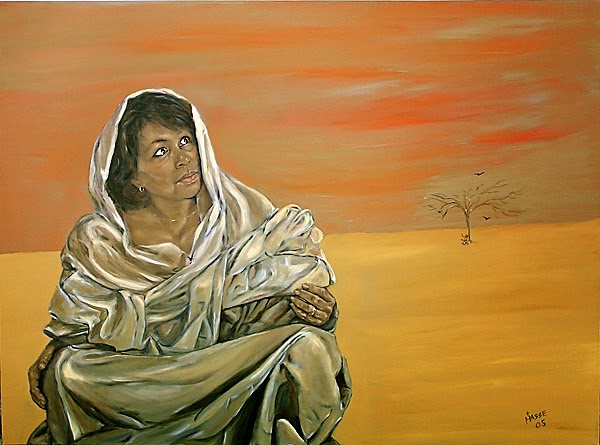Hagar.
Her name
means: flight.
Her story is
told in two brief vignettes in Genesis.
Scene 1:
When Sarah loses hope and patience that she will ever conceive the child
that God had promised Abraham, she cooks up her own plan involving her personal
servant Hagar. Of course, Hagar complies (did she have a choice?!) and ends up
pregnant. Relational fallout is no big surprise: Sarah’s scheme births not only
a son apart from the promise, but jealousy and hatred to boot. And Sarah, wielding
the upper hand, takes it out on Hagar.
So Hagar flees the conflict.
She runs
into the desert, stopping near a spring.
And God comes to Hagar.
An angel of
God gives her a glimpse into her son Ishmael’s future. Ishmael means: God hears.
God hears Hagar.
“You are the
God who sees me!” Hagar exclaims, and she follows His direction to return to
her home and her destiny – still rife with jealousy, conflict, drama.
God sees Hagar.
Scene 2: Some 14 years later, the promised
child Isaac is born to Abraham and Sarah. The palpable enmity between the two mothers
has not been lost on Ishmael; he mocks Isaac. Sarah turns on Hagar yet again,
insisting that Abraham get rid of her and her outcast son.
Abraham reluctantly
exiles his son and Hagar from the family. The last swallows of water gone, Hagar
loses all hope of surviving in this barren place. And the thought of seeing her
son die before her eyes is too much to bear.
So Hagar flees the grief.
She hides her
son beneath a bush and turns her eyes and ears away from his whimpers.
And God comes to Hagar.
He has heard
Ishmael’s cries, as well as the silent cries of Hagar’s despairing heart.
God hears Hagar.
Parched by
the desert air, blinded by her own hopeless tears, God opens Hagar’s eyes to a
well of water before her, which refreshes both her and her son.
God sees Hagar. And He helps her to see His
refreshing provision for her, too.
How tempting
it is to run from conflict and from grief! Whether we literally flee the scene, or immerse ourselves in our comfort of choice
(watching TV, shopping, eating, etc.), we imagine that our refuge will be found in escaping
the pain of our reality.
But as
daughters of God, we discover something about our flight instinct: any false
refuge is an isolated, barren desert that cannot
supply our need for hope, refreshment and companionship. We are parched for
God, and nothing else will meet our need.
We also discover
something beautiful about our God:
He comes to us, no matter how far we’ve fled.
He hears us and understands, even the deepest
griefs that we can’t voice.
He sees us more clearly than we see ourselves
and our circumstances.
He refreshes
us, lifts us gently onto our feet, directs us back toward the conflict (!), rebuilds our hope. He walks with us and sustains us as we persevere
in even the hardest reality that He has called us to.
And what if
the pressure of reality mounts, and we flee yet again? Then God meets us yet again in the desert, and reveals who He is once more.
Where
can I go from your Spirit?
Where can I flee from your presence?
Where can I flee from your presence?
If I go
up to the heavens, you are there;
if I make my bed in the depths, you are there.
if I make my bed in the depths, you are there.
If I
rise on the wings of the dawn,
if I settle on the far side of the sea,
even there your hand will guide me,
your right hand will hold me fast.
if I settle on the far side of the sea,
even there your hand will guide me,
your right hand will hold me fast.
Psalm
139: 7-10

No comments:
Post a Comment